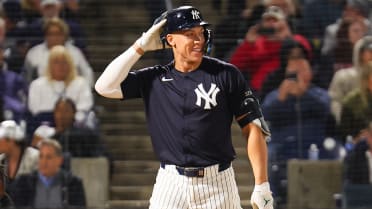Russian prospect Kuznetsov a thrill for Phils
Left-hander shows plenty of promise in first season
CLEARWATER, Fla. -- The Phillies weren't sure what to expect. How could they be? They'd never seen the kid pitch. He didn't report to camp until Spring Training was wrapping up. At the time, he was still two months shy of his 19th birthday.
Oh, yeah. And Anton Kuznetsov is from Russia. Born in Golovinski. Lives in Moscow. Spent his whole life in the former Soviet Union.
So, no, the Phillies didn't have any idea what they were getting when the left-hander showed up at the Carpenter Complex the first week in April. But it's fair to say that, in their wildest dreams, they never anticipated what's unfolded in front of their eyes.
Pitching for the Gulf Coast (Rookie) League Phillies, Kuznetsov opened his career with 14 consecutive scoreless outings totaling 18 2/3 innings. On Aug. 16, against the GCL Blue Jays, he ran his shutout streak to 20 2/3 innings before finally allowing a run in the ninth, his third inning of work.
• Phillies' Top 30 Prospects list
Kuznetsov ended the regular season with an 0.36 earned run average. Going into the playoffs, he had allowed 16 hits in 25 1/3 innings while walking four, striking out 24 and holding opposing hitters to a .184 average. He had five saves and was named to the GCL All-Star team.
"It's been amazing," said manager Roly de Armas. "He's been outstanding. He's got command, a great change-up, throws strikes, goes after the hitters. Who would have thought after all these years -- 44 years in baseball -- to see a Russian? And you see his numbers. Unbelievable."
****
If what Kuznetsov has accomplished this season seems almost like far-fetched fiction, the story of how he ended up pitching for the Phillies -- and the potential historical consequences -- are just as incredible.
If he eventually makes it to the Major Leagues, Kuznetsov could become just the sixth Russian-born player in the modern era. However, he would be the first Russian citizen to do so. The others all moved to the United States at a young age.
• Russian-born Major Leaguers in the modern era
There's also a subplot -- The Twins have two brothers -- Petru and Vadim Balan -- born in Tiraspol, Moldava, who pitched for their GCL team this year.
Earlier this season, Pirates shortstop Mpho' Ngoepe became the first African-born player to play in the big leagues. These are just more examples of how MLB is expanding its reach internationally. But while it seems as though Kuznetsov simply materialized one day out of a Russian cornfield and began mowing down hitters, there's a lot more to his back story than that.
It started when Kuznetsov was in first grade. His teacher had a son who played baseball. She suggested that seven-year-old Anton might enjoy the game.
"At that point, my parents sent me to try out for baseball," Kuznetsov said through the translator the Phillies provide for him. "In Russia, the system is a bit different. There's not a big organized system like Little League. In my school, there was essentially an announcement -- anyone who wants to play baseball, let's make a team. It would be the equivalent of T-ball. So after that announcement, we got a coach and just began to practice with people who wanted to try it out."
Kuznetsov said he's only aware of four or five baseball fields in the Moscow area, and that all equipment has to be ordered from the United States.
"Except for probably the grass they put on the fields, everything else comes from America," Kuznetsov said with a smile.
Despite the hardships, Kuznetsov persevered. He became a fan of the Yankees. Alex Rodriguez and Derek Jeter were his favorite players.
"I knew the entire roster, all the players," he said.
Sometimes he'd get up at 5 a.m. to see games live. More often, Kuznetsov would watch delayed streams on his computer or other devices.
When he was 14, Kuznetsov joined a loosely-organized league of eight to 10 teams that's considered the highest level of Russian baseball. He competed against some players who were twice his age. He had made it, at least as far as he could in his homeland.
"Because when you're in Russia and you've reached the highest point at 14 years old, you realize very quickly that there's absolutely nowhere for you to grow into," Kuznetsov said. "There's nothing else after that point. I got pretty upset, because I couldn't see how to go further in baseball."
Kuznetsov needed a break. And he got it.
The Phillies briefly employed a Russian scout about 25 years ago, but they quickly decided the return wasn't worth the investment. More recently, international scouting director Sal Agostinelli has employed independent contractor scouts like Gene Grimaldi (Antilles) and Claudio Scerrato (Italy) to monitor Europe.
Scerrato first spotted Kuznetsov at an academy in Tirano, Italy. He kept an eye on the young Russian, saw him a handful of times. He and Grimaldi both scouted Kuznetsov at the 2016 European Under 18 Championships in Barcelona.
"They saw him and they said, 'Look, man, this kid throws pretty good,'" Agostinelli said. "They said, 'He sat 87-90 and he had a real good feel for pitching. He had good arm action. He's not all that big, but he's got a chance.'
"I had never seen him pitch, but Gene had put a good grade on him. So I went with what they told me. I've got to give him and Claudio all the credit for this one."
Agostinelli also heard that others teams were interested. He told Scerrato to move quickly. There was a lot of red tape involved in signing a Russian player and arranging the proper work visas. Finally, on Sept. 8, 2016, it became official. Kuznetsov got a $10,000 signing bonus and a sizeable college tuition package.
"While the other teams [Dodgers, Reds, Pirates] were interested, the Phillies were the only ones that actually stepped up and made an offer and gave me an opportunity to come here," Kuznetsov explained.
The college package will come in handy right away. After the GCL season ends, Kuznetsov will fly home and study physical training at Moscow University.
Reaching an agreement with the Phillies represented a big step toward his dream of playing in the Major Leagues. Still, getting hitters out was only one of the hurdles Kuznetsov would face once he got to Clearwater.
Kuznetsov knew he'd eventually have to learn at last rudimentary English. It didn't really hit him how important that would be until, on his layover in Zurich between Moscow and Tampa, Fla., it took him a half-hour to figure out how to ask how to get Wi-Fi.
"I didn't really think about the importance of learning it. 'Yeah, I'll kind of take care of it, I'll find a way to get through,'" Kuznetsov said. "Then when I got here, and it was like, 'Oh, I really don't have an option.'"
His first few days in camp, Kuznetsov used the Google Translate app on his phone to communicate with the trainers and coaches.
"That's how we started," said GCL pitching coach Hector Mercado. "I downloaded Google Translate and that's how we did it for the first two weeks. After that he'd learned the basics of English, so he could understand what I was saying."
The Phillies, like most teams, have a system in place to help acculturate young Latin-American players who come to the United States for the first time. For their first Russian prospect, they hired a translator from nearby St. Petersburg Junior College.
"Now I understand a lot more, thanks to Ilya," Kuznetsov said. "When I came here, for me, it was very difficult. I couldn't understand anything. I just knew, 'Hi.' I'm very grateful to the Phillies for doing that. And that even though I don't speak a lot of English, I can speak enough to get around and get done what I need to.
"I'm also grateful for the good food that they provide. To me, that's very important. They provide a good hotel for us to live in. And, additionally, there's just a good atmosphere around the team. The experience I've had is that there are people here from so many different countries -- from Canada, from Dominican Republic, from Venezuela. When all of us first came together, we weren't really a team at all. We were just trying to blend together to make something work. But at this point, we're basically just like one."
Player development director Joe Jordan said that Kuznetsov has adjusted well.
"That's the good thing about young players that age," Jordan said. "They just mix. They figure a way to interact. They figure a way to understand each other. The kid's been very impressive socially. And, obviously, on the baseball performance side. So it's been a good summer."
Of course, none of this would matter much if Kuznetsov wasn't able to compete at this level. So far, at least, that hasn't been an issue.
"First time he throws live BP in [Extended Spring Training], I said, '[Enough of] this. He's ready, he don't need no more live BP,'" de Armas said. "He stepped right in and he's been right there with the flow.
"Coming from over there, you figure he's going to be [mechanically] crude. No strikes. Not even an idea of a breaking ball. This guy had it all from the first day. What a pleasant surprise. And [his teammates] love him. He fits right in."
The manager wasn't the only one who was impressed by how polished Kuznetsov was from the start.
"All we've had to work on was the simple stuff, like holding runners," Mercado said. "He was very impressive. I never thought he would be so polished. The way he competes is to another level. He's a competitor. And he's one of those kids you don't have to tell the same thing twice. Probably because of the language, he retains more information than the others, because he's got to pay more attention."
"He really has an advanced feel to pitch," Jordan said. "He can throw three pitches for strikes. It's not over-the-top stuff right now. His fastball velocity will touch 88, 89. But, again, he throws three pitches for strikes from the left side.
"He can throw a changeup in a fastball count. It's just been much more from a skill level than we felt like he'd have. He does have some upside potential as far as his stuff. So right now his ability to use his stuff is probably a little bit ahead of his raw velo and that sort of thing. That's kind of unusual. Usually it's the other way. You're trying to build skill level. He's had a terrific summer."
When Kuznetsov arrived in Florida five months ago, the Phillies had no idea what to anticipate. The expectations are a quite a bit higher now.
Paul Hagen, a reporter for MLB.com, won the J.G. Taylor Spink Award in 2013 for a lifetime of excellence in baseball writing.



